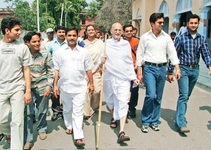
Speaking Tree
 BERNIE MEYER dresses like Gandhi and travels globally, addressing concerns on Peace and environment. Popularly known as ‘American Gandhi’, he spoke to RANJENI A SINGH in Delhi on the sidelines of the Anuvrat International Conference on ‘Ecology and Conservation of the Environment’
BERNIE MEYER dresses like Gandhi and travels globally, addressing concerns on Peace and environment. Popularly known as ‘American Gandhi’, he spoke to RANJENI A SINGH in Delhi on the sidelines of the Anuvrat International Conference on ‘Ecology and Conservation of the Environment’
We remember M K Gandhi as a historic figure. How relevant is he today?
We need Gandhi’s message the most today. With so much violence in the world, destruction of nature and depletion of resources, we are risking all life on Earth. I want to bring together the wisdom of the east and the science of the west to help create sustaining, peaceful communities. Gandhi showed us the way. We have to take it forward to ‘be the change’ we want. He saw truth in everyone and founded a modern way of nonviolence - an inadequate translation of the word ahimsa. His basic principles of seeking truth, living with love, satyagraha and ahimsa are relevant today. If he learnt something new, he changed his way of doing it but his principles on doing it remained the same. He learnt from his mistakes.
What is the connection between human rights, peace and ecological balance?
The subjects seem different but fundamentally are the same. They are part of the same reality. We evolved over a thousand years from nature. We are a part of nature, so we should function as part of nature and take care of it as we take care of ourselves. So, to honour animals and plants is honouring whatever it takes to be human. Our brain has evolved as far we can do all the things we do, but we haven’t learnt how to live at peace and to take care of the environment. We think we can treat everything as though we were God but we are not God. We must address peace as a systemic problem, work for systems that do no harm, work to end nuclear weapons and to prevent the worst effects of climate change. We must create laws and ways that do not destroy life. Too much dependence on gadgets and increasing consumerism has depleted our resources. If we follow the ideals of simplicity as adopted by Gandhi, we could restore our ecosystem.
Why has there been no consensus at climate summits so far?
We have gone down the path of technological development since the industrial revolution began in 1880. We developed a way of life that lives off fossil fuel from resources that took millions of years to develop. Carbon dioxide (CO2) levels have been consistently rising. Natural calamities like storms and floods are getting frequent. The problem is that negotiators at climate summits can’t look beyond their countries’ interest. Sometimes they are politically motivated. That is why these summits make little progress on arriving at a consensus.
Can Faith leaders help?
Sure, they can. I was a Catholic priest when the Vietnam War was growing and when the Civil Rights’ Movement was reaching its highest momentum in the US. The church got me arrested for challenging its leadership. But I was always inspired by what Prophet Isaiah said, “Turn your swords into plowshares.” Faith leaders can lend moral and spiritual voice to climate change talks and help unlock negotiations. Protecting nature is part of the core value of all religions. Religious communities in many countries in the Pacific, and in Africa, Asia and Latin America are turning towards the church for help, because people are suffering the consequences of climate change. May be one day, climate change will change our perspective as we have a common opponent that could kill us.
Can women, being more compassionate, play a more effective role in saving the environment?
Yes, they can if they don’t make themselves ‘tough’ like men. If you are tough, it’s hard to be compassionate. Being tough is different from being strong; being tough means being harsh, difficult and oppressive. And being strong means standing ground, knowing what needs to be done and doing quietly and strongly what needs to be done.
What aspect of human nature contributes to peace and what aspect undermines it?
For 23 years, I have studied the subject, ‘Why do people do violence and how to be nonviolent,’ but at the bottom of it all, violence is rooted in fear, in denial of death. Incidentally, fear is also the reason for rise in fundamentalism because these unimaginative fundamentalists let fear dominate and guide them. They don’t have information on other ways of dealing with it. We are often unconsciously afraid of death - not so much of physical death but the realisation that there is nothing after death. So to deal with that, you need a way of believing and understanding reality for what it is.
Whether you believe in God or not, whether you believe in afterlife or not, you need to trust life and live it to the fullest. The good and the bad are within us.We need to introspect and understand ourselves first.
Once you achieve peace, what do you do with it?
Peace is in here (he says pointing to his head). Peace is a deep acceptance of life. Peace is embracing life. Peace doesn’t come just like that. It depends upon your spiritual integrity and understanding, the spiritual embracing of life. Now, that is personal peace. If you talk about societal peace, inner peace reflects in your behaviour toward other people, and other species. You live peace in all that you do.